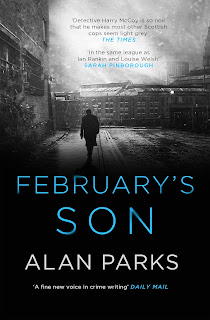February’s Son – Alan Parks
Unfortunately for Harry McCoy, he has associations with both the police and the gangs that make it difficult to know where his allegiances lie. Obviously with himself above all else, since it’s at least managed to keep him alive this far. That ambiguous quality to the character is what keeps things interesting and provides a broader view of life and crime on the streets, McCoy having to mix with some disreputable and distasteful types and take actions that lie well beyond the remit and the behaviour expected from a respected officer of the law, but evidently there’s nothing ‘normal’ about crime and police methods in Glasgow in the 70s. There’s a tough balance to be maintained in uncovering crime and just trying to keep a lid down on it.
That might seem like fairly standard ‘maverick cop’ territory, but McCoy is a much more complicated figure than that, indulging in drinking, drugs and prostitution provided by an old friendship that he has maintained with Stevie Cooper, one of the most ruthless and violent gang lords in the north of the city. Bloody January revealed however that their friendship goes back to a horrific childhood that they shared which has clearly marked them for life, and both evidently have their own ways of dealing with that experience in their choice of professions, and the moral ambiguity that lies between them.
McCoy has yet to come to terms with what Bloody January has thrown at him when February 1973 brings yet more trouble. A badly mutilated body is found at the top floor of an unfinished new office development with a message scored on his chest. It doesn’t appear to be any random drug or gang related crime, but rather the man is soon identified as Charlie Jackson, a promising young footballer playing for Celtic. Football being another of those things that create divisions in Glasgow, this could be very bad indeed, but there’s another complication; Jackson was engaged to Elaine Scobie, the daughter of Jake Scobie, one of the city’s crime lords.
The murders and violence soon escalates in February’s Son as McCoy investigates the theory that Scobie’s psychopathic former right-hand man has gone off the rails in his obsession for Elaine, and Parks’ handles the crime investigation aspects of his second Harry McCoy novel just as thrillingly and with a building sense of menace as his first book. Like the first book, the novel might be set in the 70s but it’s certainly not for nostalgia, even though the author captures the period well in his characterisation and in the choice of music references (this ought to really come with a soundtrack), and in the colourful language and biting humour.
Bloody January used its setting and period to delve beneath the surface glamour of the 70s to the reality of what lies beneath it. Glamour may be not something you associate with Glasgow in the 70s, but in February’s Son McCoy’s investigation and associates show him both sides of the social divide; the ostentatious lifestyles of the rich and privileged side by side with life for the customers of the drinking dens on the other side of town, and cops looking through catalogues to purchase necessities on the never-never. Almost invariably those with the money are up to no good and to gain money, power and prestige, you’re going to have to get your hands dirty it seems.
McCoy likewise has to get dirty in order to get to the dark motivations that lie hidden beneath the surface glamour and social respectability. He also has to come to terms with his own dark nature and propensity for violence in February’s Son when his investigations uncover other issues from his past that have never been addressed. There are consequently less of the self-conscious noir references in February’s Son and maybe less of the seventies as a setting for period colour, but rather by going back to this time we are reminded of where some of the deeper divisions we see in society now have come from.




Comments
Post a Comment